SPECIAL RIGHT TRIANGLE PROBLEMS SAT
Subscribe to our ▶️ YouTube channel 🔴 for the latest videos, updates, and tips.
Problem 1 :
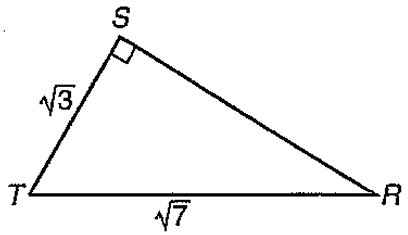
In the figure above, what is the length of RS ?
a) √7 - √3 b) 2 c) 4 d) 7 + √3 e) 10
Solution :
In the right triangle,
TR2 = TS2 + SR2
√72 = √32 + SR2
7 = 3 + SR2
SR2 = 7 - 3
SR2 = 4
SR = √4
SR = 2
So, the measure of RS is 2.
Problem 2 :
In triangle ABC, ∠C = 90, CD = BD and the ratio of the measure of ∠A to the measure of ∠B is 2 to 3. What is the value of x ?
a) 18 b) 36 c) 40 d) 54 e) 72
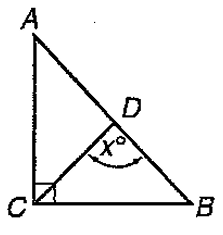
Solution :
In the right triangle ABC,
∠A : ∠B = 2 : 3
∠A = 2x and ∠B = 3x
∠A + ∠B + ∠C = 180
2x + 3x + 90 = 180
5x = 180 - 90
5x = 90
x = 90/5
x = 18
∠DBC = ∠DCB
3x = ∠DCB
3(18) = ∠DCB
∠DCB = 54
In triangle DCB,
∠DCB + ∠DBC + ∠CDB = 180
54 + 54 + ∠CDB = 180
108 + ∠CDB = 180
∠CDB = 180 - 108
∠CDB = 72
So, the value of x is 72. Option e is correct.
Problem 3 :
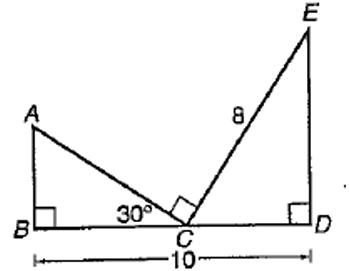
In the figure given above, what is the length of the line segment AB ?
a) 3 b) 2√3 c) 4 d) 3√3 e) 6
Solution :
∠BCA + ∠ACE + ∠ECD = 180
30 + 90 + ∠ECD = 180
120 + ∠ECD = 180
∠ECD = 180 - 120
∠ECD = 60
Let BC = x, then CD = 10 - x
In triangle CED,
CE = hypotenuse = 8
Hypotenuse = 2(smaller side)
2 (10 - x) = 8
10 - x = 8/2
10 - x = 4
x = 10 - 4
x = 6
BC = x = 6
√3 smaller side = the side which is opposie to 60 degree
BC = √3AB
6 = √3AB
AB = 6/√3
AB = (6/√3) ⋅ (√3/√3)
= 6√3/3
AB = 2√3
So, option b is correct.
Problem 4 :
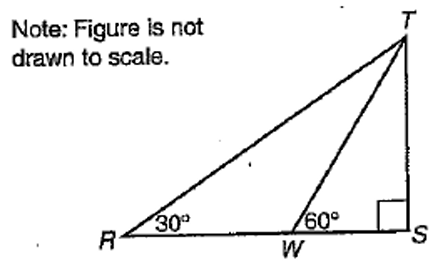
In the figure given above, what is the ratio of RW to WS ?
a) √2 to 1 b) √3 to 1 c) 2 to 1 d) 3 to 1 e) 3 to 2
Solution :
In triangle TRS,
∠RTS = 180 - (30 + 90)
= 180 - 120
= 60
Let WS = x (the smaller side)
RS = √3x
RW = RS - WS
= √3x - x
RW = (√3 - 1)x
RW : WS = (√3 - 1) x : x
= (√3 - 1) : 1
So, option c is correct.
Problem 5 :
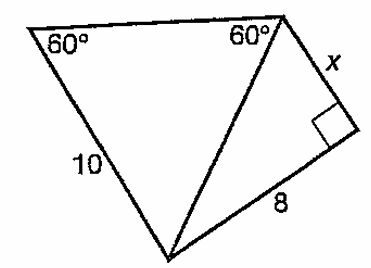
In the figure above, x = ?
a) 4 b) 6 c) 4√2 d) 4√3 e) 8√3
Solution :
In the 30-60-90 right triangle,
Hypontenuse = 10
Using Pythagorean theorem,
102 = 82 + x2
100 = 64 + x2
x2 = 100 - 64
x2 = 36
x = 6
So, option b is correct.
Problem 6 :
Find 𝐴𝐶 if ∠𝐴 = 30°, ∠𝐷 = 45°, and 𝐵𝐷 = 8.

Solution :
In triangle ABC,
∠𝐴 = 30°, ∠C = 90°, ∠ABC = 60°
In triangle BCD,
∠D = 45°, ∠C = 90°, ∠DBC = 45°
Let CD = x = BC
BD2 = BC2 + CD2
82 = x2 + x2
2x2 = 64
x2 = 64/2
x2 = 32
x = √32
= √(2 x 2 x 2 x 2 x 2)
x = 4√2 = CD = BC
BC is the side which is opposite to 30 degree. Then the measure which is opposite to 60 degree will be √3(4√2)
AC = 4√6
Problem 7 :
Given: Right ∆𝐴𝐵𝐶 with ∠𝐶 = 90° and ∠𝐴 = 60°; 𝐴𝐵 = 20. Find: 𝐵𝐶
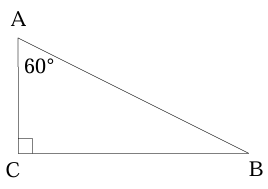
Solution :
AB = hypotenuse
BC = the side which is opposite to 60 degree
AC = the side which is opposite to 30 degree and smaller side
2AC = AB
2AC = 20
AC = 20/2
AC = 10
BC = √3(AC)
= 10√3
So, the length of BC is 10√3.
Problem 8 :

In the figure above, if AD = BD = 2√3, what is the length of AB ?
a) 4√3 b) 3√6 c) 6 d) 6√2
Solution :
Triangle ABC is a 30-60-90 speical right triangle. ∠CDA = 60 degree and ∠CAD = 30
Triangle ACD is also an 30-60-90 special right triangle.
AD = 2(CD)
2√3 = 2CD
CD = √3
AC = √3(CD)
= √3(√3)
= 3
CD + DB = √3 + 2√3
BC = 3√3
AC2 + BC2 = AB2
32 + (3√3)2 = AB2
9 + 9(3) = AB2
AB2 = 9 + 27
AB2 = 36
AB = 6
So, option c is correct.
Problem 9 :
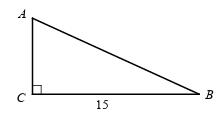
In the figure above, the area of right triangle ABC is 60. What is the perimeter of ABC?
a) 34 b) 36 c) 38 d) 40
Solution :
Area of right triangle = (1/2) x base x height
base = 15 and height = h
60 = (1/2) x 15 x h
60(2) / 15 = h
h = 120/15
h = 8
AC2 + BC2 = AB2
82 + 152 = AB2
64 + 225 = AB2
AB2 = 289
AB = √289
AB = 17
Problem 10 :
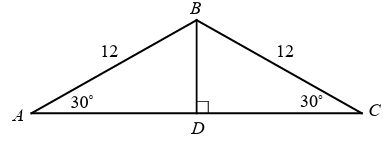
In the figure above, what is the area of ABC?
a) 24√3 b) 30√3 c) 36√3 d) 48√3
∠ABD = 60 and ∠DBC = 60
AB = 2(BD)
12 = 2(BD)
BD = 12/2
BD = 6
AD2 + BD2 = AB2
AD2 + 62 = 122
AD2 = 144 - 36
AD2 = 108
AD = √108
= √(3 x 6 x 6)
AD = 6√3
AC = 2(AD)
= 2(6√3)
= 12√3
Area of triangle = (1/2) x 12√3 x 6
= 36√3
So, option c is correct.
Subscribe to our ▶️ YouTube channel 🔴 for the latest videos, updates, and tips.
Recent Articles
-
Finding Range of Values Inequality Problems
May 21, 24 08:51 PM
Finding Range of Values Inequality Problems -
Solving Two Step Inequality Word Problems
May 21, 24 08:51 AM
Solving Two Step Inequality Word Problems -
Exponential Function Context and Data Modeling
May 20, 24 10:45 PM
Exponential Function Context and Data Modeling